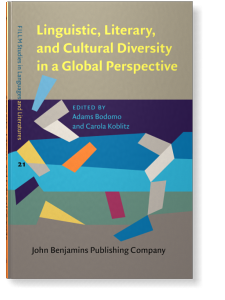FILLM Studies in Languages and Literatures
By the end of the twentieth century, FILLM’s mission was taking on considerable urgency. Linguistic and literary research had become steadily more professional and specialized, a development which, though significantly raising overall standards, also tended to divide scholars into many separate and often smallish groupings between which communication was rather sporadic. Over the years this amounted to a serious handicap, not only in terms of new ideas and findings which never got cross-fertilized, but also in terms of the hard economic facts of disciplinary survival. Scholars who concentrated all their attention on just some single area of expertise sometimes found it difficult to convince the holders of governmental or university purse-strings that education and research in languages and literatures was a worthwhile investment.
In the world’s current phase of hyper-rapid globalization, the relative lack of contact between scholars in different subject-areas is a more glaring anomaly than ever. In setting up FILLM Studies in Languages and Literatures, FILLM is intensifying still further its efforts to foster a world-wide community of scholars within which a rich diversity of interests will be upheld by a common sense of human relevance. Books published in the series will be about languages and literatures anywhere in the world, and will be written in an English that is immediately understandable and attractive to any likely reader. Every book will present original findings – including new theoretical and methodological developments – which will be of prime interest to those who are experts in its particular field of discussion, but it will do so in a way that can also engage readers who are not experts.
This dual address is the series’ chief hallmark. The overall goals are, on the one hand, to spread detailed insights on particular phenomena from many different countries and, on the other hand, to guard against scholarly provincialism and overspecialization. In this way FILLM is hoping to promote a universal dialogue about linguistic and literary studies which, by clarifying their human raison d’être, will consolidate their professional legitimation.
Volumes
| 21 |
Edited by Adams Bodomo and Carola Koblitz
2024. xi, 275 pp.
|
| 20 |
Edited by Petra Broomans and Jeanette den Toonder
2024. xii, 207 pp.
|
| 19 |
Edited by Anna Guttman and Veronica J. Austen
2024. xvii, 239 pp.
|
| 18 |
Edited by Tom Clark
2022. xv, 240 pp.
|
| 17 |
Edited by Pia Maria Ahlbäck, Jouni Teittinen and Maria Lassén-Seger
2022. ix, 256 pp.
|
| 16 |
Edited by Antoinina Bevan Zlatar, Mark Ittensohn, Enit Karafili Steiner and Olga Timofeeva
2021. xv, 252 pp.
|
| 15 |
Edited by Gunilla Hermansson and Jens Lohfert Jørgensen
2020. xix, 342 pp.
|
| 14 |
Roger D. Sell
2020. xii, 425 pp.
|
| 13 |
Décio Torres Cruz
2019. xv, 325 pp.
|
| 12 |
Edited by Meenakshi Bharat and Madhu Grover
2019. xix, 363 pp.
|
| 11 |
Edited by Tommi Alho, Jason Finch and Roger D. Sell
2019. xi, 273 pp.
|
| 10 |
Roger D. Sell
2019. xii, 396 pp.
|
| 9 |
Edited by Casie Hermansson and Janet Zepernick
2018. xix, 431 pp.
|
| 8 |
Edited by Raul P. Lejano
2018. xii, 170 pp.
|
| 7 |
Anders Pettersson
2017. xiii, 196 pp.
|
| 6 |
David Lucking
2017. xxii, 192 pp.
|
| 5 |
Edited by Tom Clark, Emily Finlay and Philippa Kelly
2017. xv, 235 pp.
|
| 4 |
Elina Siltanen
2016. x, 210 pp.
|
| 3 |
Jason Finch
2016. xiii, 249 pp.
|
| 2 |
Edited by Sarah J. Paulson and Anders Skare Malvik
2016. xiii, 265 pp.
|
| 1 |
Edited by Theo D’haen, Iannis Goerlandt and Roger D. Sell
2015. xv, 280 pp.
|
Board
Submission
The series welcomes submissions. Book proposals, preferably structured along the lines indicated in our Guidelines for Book Proposals, can be sent to the editor: hsaussy
When you are instructed to prepare your manuscript for production, please follow the Guidelines for Manuscript Submission.
